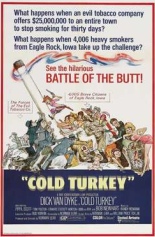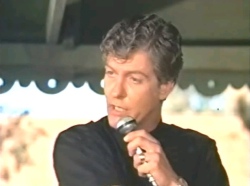
 The first and last directorial effort of legendary TV producer Norman Lear (All in the Family), 1971’s Cold Turkey lacks the bite of Robert Altman’s Nashville or the verisimilitude of Michael Ritchie’s Smile, but it suggests Lear could have become as gifted a cinematic satirist as either, if he had wanted. Like the best comedies of the era, the movie mixes genuine laughs with incisive social commentary, much of which feels even more relevant now than it must have 40 years ago.
The first and last directorial effort of legendary TV producer Norman Lear (All in the Family), 1971’s Cold Turkey lacks the bite of Robert Altman’s Nashville or the verisimilitude of Michael Ritchie’s Smile, but it suggests Lear could have become as gifted a cinematic satirist as either, if he had wanted. Like the best comedies of the era, the movie mixes genuine laughs with incisive social commentary, much of which feels even more relevant now than it must have 40 years ago.
Dick Van Dyke stars as an ambitious reverend stuck in the dying town of Eagle Rock, Iowa. His only hope for escape is that the government might open a munitions plant in the area, but that’s dependent on the town significantly improving itself to deal with the influx of people such a project would bring. Desperate, he and the town’s mayor (Vincent Gardenia) jump at the offer dreamed up by Big Tobacco lobby ad man Bob Newhart to pay $25 million to any town that can convince its entire population to quit smoking for a whole month.
 The locals are wary. The smokers are upset they’re the only ones asked to make a sacrifice, while the town’s right-wing coalition worries such a collective effort reeks of old-fashioned communism. Both groups eventually are persuaded by the reverend’s eloquence and — in the right-wingers’ case — the chance to form an authoritarian militia dedicated to keeping fellow citizens from lighting up. The town soon earns national media attention (as represented by the classic comedy duo Bob and Ray) and profits from the exposure, but at what cost?
The locals are wary. The smokers are upset they’re the only ones asked to make a sacrifice, while the town’s right-wing coalition worries such a collective effort reeks of old-fashioned communism. Both groups eventually are persuaded by the reverend’s eloquence and — in the right-wingers’ case — the chance to form an authoritarian militia dedicated to keeping fellow citizens from lighting up. The town soon earns national media attention (as represented by the classic comedy duo Bob and Ray) and profits from the exposure, but at what cost?
Lear mines comedy gold out of his characters’ greed and uniquely American political views. As darkly absurdist as the climax may be, it seems like a mild stretch away from what actually would happen if this scenario played out in real life — his only real misstep being the inclusion of an actor in a truly terrible Richard Nixon mask in place of a fictionalized president. Beyond this, Cold Turkey is significant for featuring the first musical score composed by Randy Newman, whose beautifully cynical theme song, “He Gives Us All His Love,” sets the tone perfectly. —Allan Mott
